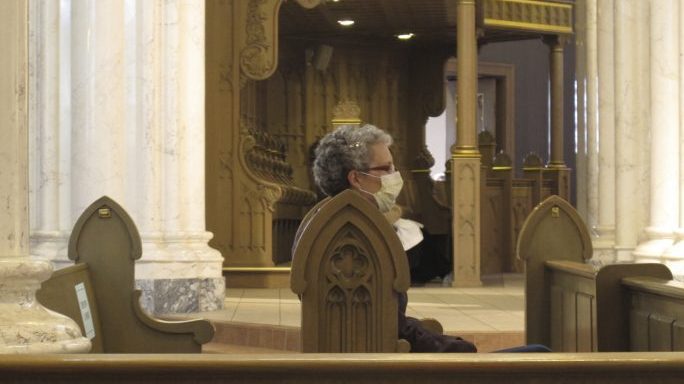One day after the Italian Prime Minister declined to offer a date for restarting public Masses in his “phase 2” plan for lifting of the country’s COVID-19 coronavirus restrictions, with some advisers saying it might not happen until the end of the month, one church official in Milan said faithful want Mass now.
“The people have been asking since before yesterday. For them it’s the first thing,” Monsignor Bruno Marinoni told Crux.
It is the task of the bishops, “to express their desire. What we have repeated in every instance is that we must be in respect of the rules, and we must be within the indications to safeguard the health of citizens,” while also finding a way for people to access the sacraments.
Moderator of the curia for the Archdiocese of Milan, Marinoni is overseeing an archdiocesan consultation with the faithful over what a “phase 2” gradual return to normal life might entail.
As part of the consultation, Catholics in Milan have been asked to send in suggestions for restarting different areas of ecclesial life, from public liturgies, to the reopening of oratories and charitable initiatives. These suggestions are then passed onto the Italian bishops’ conference (CEI), which in turn brings them to the table in discussions with the government.
Launched last week, the initiative has so far drawn over 1,000 replies offering “very different responses” to the question.
Yet the most prominent theme “was the desire to start celebrating the Eucharist in the parishes. This is the most important theme, the first data of communication,” Marinoni said, adding, “We all feel the lack of being able to celebrate the Eucharist, to receive communion and to see again the people with whom we share our lives.”
On Sunday Italian Prime Minister Giuseppe Conte held a press conference in which he outlined his gradual “phase 2” plan for returning to normal life after the coronavirus. The CEI has been in conversation with the government for several weeks about restarting public liturgies, and it was widely expected that Conte would provide a date on which Masses and other religious services are allowed to begin again, however, he skipped over the issue almost entirely, addressing only the topic of funerals.
CEI immediately issued a statement criticizing the government, after weeks of negotiation and revised proposals, for “arbitrarily” issuing a decree which “excludes the possibility of celebrating Mass with the people.”
“The Italian bishops cannot accept to see the exercise of the freedom of worship compromised,” they said, insisting that while it is the government’s task to provide sanitary guidelines, the role of the Church is to “organize the life of the Christian community, in compliance with the disposed measures, but in the fullness of its own autonomy.”
Many interpreted CEI’s statement as a threat that if the government doesn’t get Masses started again soon, they will begin acting on their own authority, guaranteed by religious freedom provisions in the Italian constitution.
However, Marinoni said he does not believe CEI will act unilaterally but will continue to pursue “a coherent and balanced” negotiation. “The government has to give its indications for the life of the people,” Marinoni said, insisting that CEI officials will, in his view, likely focus more on finding a joint solution “rather than a contrast.”
“I think that the strength with which CEI reacted to this decree is a way of saying, let’s think in an urgent way about the prospect of cohesion,” he said, saying that in his view, social cohesion would be a key consideration for the bishops.
Marinoni also said he does not believe the question of access to Mass, and the government’s hesitancy to greenlight public liturgies, in the time of the coronavirus is a religious freedom issue.
“Right now I think it’s more the need to get out of this emergency…we are just at this phase and I think they struggle to see the recovery in Phase 2,” he said, voicing his belief that the government and scientists are all acting according to what they believe is best given their competencies.
“It’s not an ideological, partisan discussion…The resistance I see more in this regard, not so much that someone is going against ecclesial life or the possibility of receiving the Eucharist.”
Asked if people were angered over Conte’s announcement that parks, museums, shops and restaurants all have potential reopening dates while the Church still does not have a date to restart Masses, Marinoni said “you would have to ask the government” for their reasons.
At the level of the dioceses, “We are trying to make understood what our ways are of celebrating the Eucharist,” keeping in mind the need to maintain proper distance, and to wear masks and gloves. “I think there is the possibility of gradually finding a way to reopen the churches” and to celebrate Mass, provided that these conditions are met, he said.
He praised the creativity with which parishes have been reaching out to their congregations during the lockdown, noting that in addition to livestreamed Masses and prayers, some have even held digital rosaries with up to 1,000 participants or more when someone from the parish dies.
“It’s not a definitive solution, but it can be a valid compliment to ordinary life and what has always been done,” he said, adding the archdiocesan community “is beginning to reflect on this time as an opportunity to evangelize in every field. So, it’s not just a passing moment, but … we must ask ourselves how to be close to our community.”

